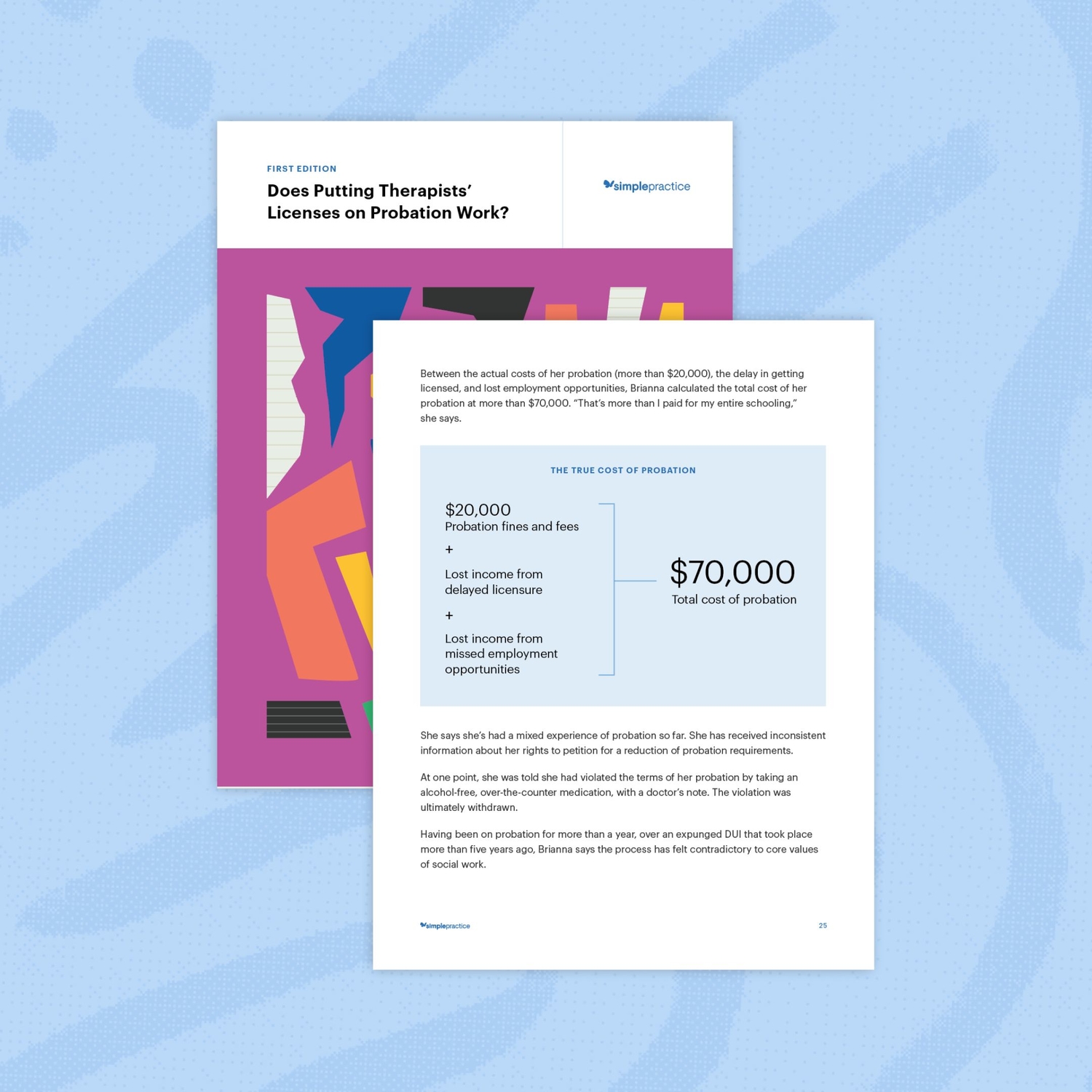Does Putting Therapists’ Licenses on Probation Work?
Dive deeper into what the future of licensure might look like
Download free resource
Enter your email below to access this resource.
By entering your email address, you are opting-in to receive emails from SimplePractice on its various products, solutions, and/or offerings. Unsubscribe anytime.

Several years ago, Sarah (whose name has been changed for privacy) applied for registration as an associate marriage and family therapist. During the application process, she provided her licensing board with documentation of her criminal history: a DUI in 2005 and two other convictions for non-violent offenses a few years later. By the time she applied for registration, all of the convictions had been expunged from her record and she had almost three years of sobriety.
“I was honest with the board about everything,” she says. “I knew that I was going to have to explain my past.”
She says a staff member for the California Board of Behavioral Sciences (BBS) assured her by phone that, given the age of the convictions, the fact that they had been expunged, and her rehabilitative efforts since then, she “shouldn’t worry too much” about her history. A few months later, the BBS sent Sarah a letter denying her application. “I was devastated,” she says.
She appealed, negotiated with the state Attorney General and the BBS, and ultimately agreed to a deal that would allow her to become an Associate MFT while putting her registration under a 5-year probation term.
“I had no idea how horrific it would actually be.”
When a licensed therapist—or one on their way to licensure—is found to have violated standards of professional behavior, their licensure board can place their license on probation. Some of the possible consequences of probation include a professional being unable to supervise new professionals or tech continuing education courses, and having to inform prospective employers or new clients about probation.
Whether these elements are applied, and which ones, can vary by licensing board and by specific case. Where they are applied, these conditions can greatly limit a person’s career opportunities, but they do allow a practicing therapist to continue to practice. Probation terms usually last from one to five years.
However, license probation is not used for the most serious offenses. A therapist having sex with a client, engaging in insurance fraud, or committing egregious violations of confidentiality will likely have their license revoked. And offenses considered to be very low-level, like a failure to complete required continuing education for license renewal, may simply result in a citation and a fine.
Probation is the outcome for therapists whose violations are somewhere between those extremes. Many are put on probation by their licensing board as the result of a criminal conviction over acts that occurred outside of one’s professional role.
Because the amount of people put on probation increased during the timeframe the BBS provided, the data reflected in this ebook probably underestimates the proportion of probationers who successfully complete their probation.
But for the most part, it appears that therapists whose licenses or registrations are put on probation do not complete their probation term. Most appear to give up on licensure or their path toward it. Many turn to coaching instead—providing similar services with less consumer protection.
Download this free ebook today to dive deeper into what the future of licensure might look like.
How SimplePractice streamlines running your practice
SimplePractice is HIPAA-compliant practice management software with everything you need to run your practice built into the platform—from booking and scheduling to insurance and client billing.
If you’ve been considering switching to an EHR system, SimplePractice empowers you to streamline appointment bookings, reminders, and rescheduling and simplify the billing and coding process—so you get more time for the things that matter most to you.
Try SimplePractice free for 30 days. No credit card required.

